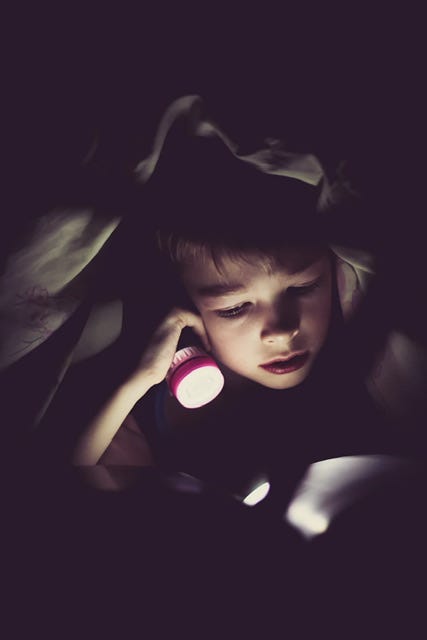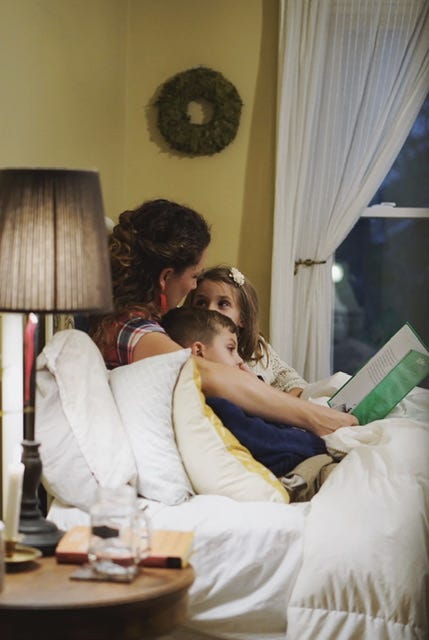(If you missed Part 1, find it here.)
7. Make the most of a captive audience
We don’t have a car, so almost every time we leave the house we have to sit on trains and/or buses. Personally, I can happily stare out of a train window for hours, but the children find it pretty dull. Solution: take books! And importantly, nothing else, entertainment-wise (see point 4: Limit Screens). My husband can barely walk as far as the corner shop without at least one book in his pocket (and usually with half a dozen in a tote bag). Sometimes I choose the children’s book—after a home ed sports day recently, the only book in the rucksack was our Ancient Greek textbook, which the children asked me to read to them on the way home after hours running around in the sunshine. A few years ago I chucked The Animals of Farthing Wood in the bag before a day out, thinking they were probably too young for it, but they listened spellbound for hours.
But usually I ask them to choose a book (or more likely, books). My son in particular hates to leave the house, but if he can bring a book with him the pain is significantly reduced. It gives them some degree of control, and it means when they’re bored on the train they have something they chose themselves to keep them busy.
On the rare occasions we do a long car journey, they listen to an audiobook. Because real books are great, but carsickness is not. (When Audible has a half-price offer I think it’s good value. When there’s no offer, we use library apps like Libby and BorrowBox.)
NB What I am not so good at is remembering to bring a book of my own. Getting out of the house seems such a Herculean task that my own bits and pieces invariably get forgotten. Must try harder.
8. Tread carefully when your child is learning to read
In an earlier post about how my children learnt to read, I mentioned that when my daughter hit a wall with reading I realised that I could either force her to do some daily reading practice (I had climbed down from asking her to read one reading book a day, to one page of any book, to a single sentence), which would make her hate me and hate reading in equal measure, or I could back off entirely. She loved books at that point, but hated reading. I chose to preserve her love of books by easing off the reading entirely. I read whatever she wanted. To start with I followed the words with my finger but she would bat my hand away, so even that had to stop.
A few months later (or was it a year? I forget.), she started reading herself. She was so obsessed with her new skill that the only way I could get her to leave the house was to tell her she could bring the books along too. For a while, every weekend became an urgent hunt for the next stage of the Biff and Chip books in the secondhand bookshops of Greater London.
My point is, when your child is learning to read, remember that the ultimate goal is a child who wants to read, not just a child who can read but thinks that books are instruments of torture.

9. Lead by example
It is no good to tell your child that books are wonderful if you yourself spend any free time you have on your phone. This might be the hardest of all these points to follow through on. Which if us doesn’t reach for our phone the moment we have the chance? Certainly I do. Here are some suggestions:
Put your phone out of sight. Out of sight is (slightly) out of mind.
Prioritise buying/borrowing excellent books for yourself, not just for your children. When you see a book you can’t wait to read, get it.
Keep a list somewhere of books you want to read.
Try to remember to take your book with you when you are out and about with the children (especially in playgrounds, when they run off to play happily for hours. You can read a lot of pages in that time and it’s good for the children to have some benign neglect.) Stick a note on the front door to remind you.
Have a look at
’s Digital Detox posts.
Klim Sergreev via Unsplash
10. Books make great Easter eggs
If you want children to prize books, then act as though books are prized objects.
One Easter during Covid, we were at home, just the four of us. Easter eggs had been delivered from family and friends in advance, and I could see the mountain of chocolate awaiting my children come Easter Sunday. It was clear that there was no point adding our own offering to this pile. It so happened that a kind neighbour had given us some new Julia Donaldson books that she had going spare, so I gave these to the children for their Easter presents. They loved them, and of course the pleasure was much longer-lasting than the chocolate—we still read them several years later. We’ve kept the tradition, and I suspect the children assume that all children are given new books at Easter by their parents. I can’t claim the books are more exciting than the chocolate but they are certainly an integral and eagerly-awaited part of the celebration.
One year a generous godmother gave my son a whole box of books for his birthday. I think she had possibly been collecting them slowly for some time. What an amazing gift! It was like a treasure chest!
Other ideas: bookshop/library trips to mark the beginning of a holiday season, or the end of a learning season, or the completion of a major project. A new Christmassy book to mark the beginning of Advent. On other children’s birthdays, I ask my two to think of a book that they have really loved that they think their friend might like too. I like the way this shares a love of books as well as reinforcing the idea that a book is a lovely gift to give or receive.
11. Don’t test them on their reading
(Yes, it was meant to be ten ways. I kept thinking of more.)
Nothing saps the enjoyment from a good book more than the sense that someone else is testing you to see how much you really understood it. By all means talk about books with your child, but don’t quiz them. You can see how much they understand simply from a general chat. Sometimes when I’m reading aloud I ask, at a cliffhanger, “oh my goodness, what do you think is going to happen next?!” When they come to me telling me they’ve just finished a book, I ask the same sort of questions I’d ask an adult: How was it? Was it exciting? Oh gosh that sounds very dramatic/sad/scary… That’s enough to prompt them to tell me all about it. For non-fiction, I often ask them to tell me the most interesting fact they came across in the book. They are keen to share their discoveries.
A child who isn’t understanding what they read won’t want to read very much or will tell you they’re hopelessly lost. My daughter read a children’s version of The Count of Monte Cristo, racing through it one evening. She obviously understood enough to find it very exciting, but she declared at the end that she had no idea what had happened. Comprehension exercises are pretty dull and they certainly don’t add to the enjoyment of reading. Perhaps there is a place for comprehension work in schools, but in a home environment I think the aim of finding out how much your child understands can be happily achieved by a friendly chat. And not for every book, but just now and then.

12. Stack the odds
I do let the children choose their own books on library visits. But I think that if you want to increase the odds of your child falling in love with books, you need to give them books that they can fall in love with. Often the silly, toilet-humour books they want from the library are quickly cast aside back at home. Books to fall in love with are meatier (appropriately for the age group), crafted by skilled authors who weigh each word. They have often stood the test of time, but they can also be hot off the press. They are generally not to be found in series of twenty or more almost-identical books that the children consume like candy. (Lovers of Enid Blyton may take issue with this. I loved Mallory Towers myself. Every rule has its exceptions.) They are what Charlotte Mason called ‘living books’:
One more thing is of vital importance; children must have books, living books. The best is not too good for them; anything less than the best is not good enough. And if it is needful to exercise economy, let go everything that belongs to soft and luxurious living before letting go the duty of supplying the books, and the frequent changes of books, which are necessary for the constant stimulation of the child’s intellectual life.
I go through phases of spending a lot of time searching out these books. Browsing in libraries and bookshops, going down internet rabbit-holes, ‘if you liked this you might also like…’ and so on. I don’t have a definitive list of my own, or a list of where to look to build yours. But perhaps that’s a post for another time…
Thank you for reading. If you’re not a subscriber, sign up for free and never miss a post.




We have to stock up on English language books whenever we travel through the US or UK - I'd love to hear some good recommendations for the 'meatier' books! I have been picking ones I remember - but I know there would be so many amazing new ones.
Such good advice here! I agree wholeheartedly (I’m mother to two older book-lovers, ages 13 and 11).